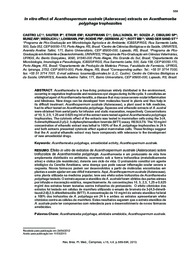In vitro effect of Acanthospermum australe (Asteraceae) extracts on Acanthamoeba polyphaga trophozoites.
In vitro effect of Acanthospermum australe (Asteraceae) extracts on Acanthamoeba polyphaga trophozoites.
Author(s): CASTRO, L. C.; SAUTER, I. P.; ETHUR, E. M.; KAUFFMANN, C.; DALL'AGNOL, R.; SOUZA, J.; CIBULSKI, S. P.; MUNIZ, A. W.; WEIDLICH, L.; LOHMANN, P. M.; ROEHE, P. M.; GERMANI, J. C.; ROTT, M. B.; VAND DER SAND, S. T.
Summary: Efeito in vitro de extratos de Acanthospermum australe (Asteraceae) sobre trofozoitos de Acanthamoeba polyphaga. Acanthamoeba é um protozoário de vida livre amplamente distribuído no ambiente, ocorrendo sob a forma trofozoítica (metabolicamente ativa) e cística (de resistência), durante seu ciclo de vida. O protozoário constitui um agente etiológico da Ceratite Amebiana, uma doença que pode causar inflamação ocular severa e cegueira. Novos fármacos podem ser desenvolvidos a partir de moléculas encontradas em plantas e assim ajudar em seu difícil tratamento. Aqui, Acanthospermum australe (Asteraceae), uma planta utilizada na medicina popular, teve seu efeito sobre trofozoítos de Acanthamoeba polyphaga testado.
Publication year: 2013
Types of publication: Journal article
Unit: Embrapa Western Amazon
Observation
Some of Embrapa's publications are published as ePub files. To read them, use or download one of the following free software options to your computer or mobile device. Android: Google Play Books; IOS: iBooks; Windows and Linux: Calibre.
Access other publications
Access the Agricultural Research Database (BDPA) to consult Embrapa's full library collection and records.
Visit Embrapa Bookstore to purchase books and other publications sold by Embrapa.

